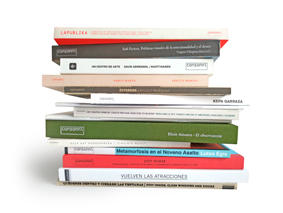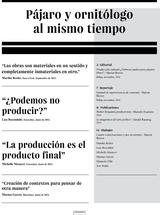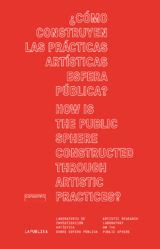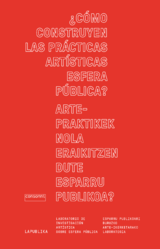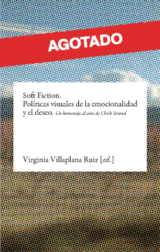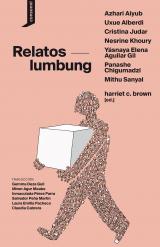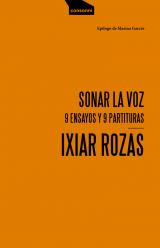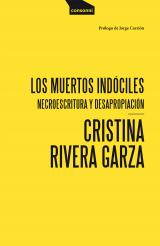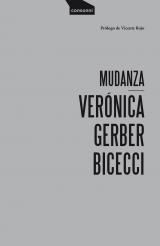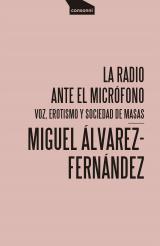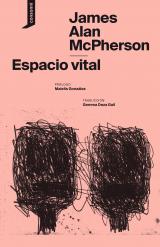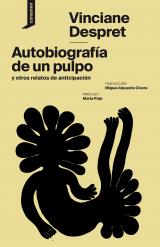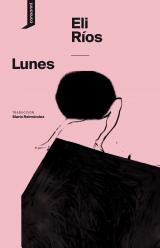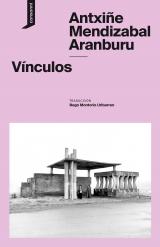
Relatos lumbung
«Este libro es una celebración de lo colectivo frente a lo individual, de la creatividad que crece no sobre lo que nos distingue de los demás sino sobre aquello que nos une». —José Ovejero
«Este libro desafiante convoca a voces de diferentes continentes que tejen un posible manual de instrucciones para la utopía». —Jorge Carrión
Every book is a collective project and this is radically so. This is an anthology of fictional stories about the ways and possibilities of collaborating. Various ancestral terms are traced to describe community practice: lumbung in Indonesia, auzolan in Euskal Herria, mutirão in Brazil, fa'zaa in Arab countries, tequio in Mexico, ubuntu in South Africa, Allmende in Germany... Relatos lumbung is written by a diversity of voices from these different cosmologies of the common. harriet c. brown is a collective body that edits and prefaces the book, Azhari Aiyub, Uxue Alberdi, Cristina Judar, Nesrine Khoury, Yásnaya Elena Aguilar Gil, Panashe Chigumadzi, Mithu Sanyal... imagine the possibilities of collaborative practice. Each story takes us from one territory to another.
Reading becomes physical, the smells and textures are palpable, the characters accompany us, the phrases shake us. The cooperation between shamans and tigresses in the face of capitalist exploitation; the almost instinctive coordination among adolescents eager to understand their environment; dances, music, atavistic rites and camaraderie to build identities; common work in the field, in the roots and in memory; a future that bases its society on the collective; cries against racism and discrimination and generational empowerment, and, finally, an epilogue on the resurgence of the commons. Words mobilize the common, fiction weaves the networks.
We take the collective notion of the book to the extreme by publishing different editions by independent publishers from different territories, under the notion of cooperation and contagion and within the framework of documenta fifteen. The writing-community pairing should involve both production and distribution, and this book intervenes and transforms these ways of doing things. We need plural and diverse narratives to heal the current wounds that have their roots especially in colonialism, capitalism or patriarchal structures.
In addition to this edition, this book is published simultaneously in different parts of the world in seven languages by the following publishers: Marjin Kiri, Txalaparta Argitaletxea, Dublinense, Al-Mutawassit, Almadía, Cassava Republic Press and Hatje Cantz.
harriet c. brown. Harriet Brown was the name the Swedish actress Greta Garbo chose when she abandoned the world of cinema and hid away in her New York apartment in the 1940s. Harriet Brown has given name to some women’s rights activists and anti-racist activists and many other initiators/pioneers of beginnings to whom we pay tribute. documenta fifteen, ruangrupa and consonni are written without capital letters, as is harriet c. brown. We use this pseudonym to refer to the collective entity formed by the diversity of bodies of consonni and the involved members of the artistic team of the Artistic Team. It’s a being-in-common, a literary being. harriet c. brown is a lumbung body we recover now as a practice of community to manufacture the present and put it into a textual body.
Azhari Aiyub was born in Banda Aceh (1981). He was awarded first prize in the Ministry of Education and Culture’s short story writing competition in 2003, before receiving the Poets of All Nations’ Free Word Award in 2005. In 2007 he received fellowship from the International Institute for Asian Studies (IIAS) in Amsterdam and Leiden. In 2015 Azhari was selected for a writer’s residency in Mexico, resulted in his travelogue Tembok, Polanco, dan Alien: Suatu Petualangan Kecil ke Negeri Meksiko [Wall, Polanco and Alien: A Little Adventure in Mexico] (2019). His short story collections Perempuan Pala [Nutmeg Woman] and The Garden of Delights & Other Tales have been translated into English, German and French. His almost 1,000 pages novel, Kura-kura Berjanggut [The Bearded Turtle] won 2018 Khatulistiwa Literary Award.
Uxue Alberdi Estibaritz is an author and bertsolari (Basque folk singer) born in Elgoibar, 1984. She writes short stories, novels, essays, historic literature, and children’s literature. She has received the Basque Literature Award on two occasions, once for her children’s book Besarkada (‘Hug’), and again for her essay Kontrako Eztarritik (‘Down the wrong chute’). Her most recent novel, Jenisjoplin, was awarded the 111 Akademia prize, and translated into Spanish and English.
Cristina Judar was born in São Paulo, is a writer and journalist, author of the novel The women who marched under the sun (2021), just sold to Arabic and Mozambique, and Oito do sete, winner of Prêmio São Paulo de Literatura 2018 and shortlisted for Prêmio Jabuti 2018. She is also the author of Roteiros de uma vida curta, the graphic novels Lina and Vermelho, vivo and the art project ‘Questions for a live writing’ conceived during an artist residency at Queen Mary University of London. Her short stories were translated and published in literary supplements and anthologies in the US, UK and Egypt (she is in this very recently published anthology organized in the US).
Nesrine Khoury was born in Syria in 1983 and lives in Alicante, Spain. Her first book of poetry, ‘With a Drag of War’, was published in 2015 by Attakwin, Damascus. Her novel, ‘Wadi Qandil’, was published by Al- Mutawassit in 2017. She is translated into English, Spanish, French, Catalan and Italian.
Yásnaya Elena Aguilar Gil (Ayutla Mixe, 1981) is an ayuujk linguist, writer, translator, linguistic rights activist and researcher. She is part of Colegio Mixe, a collective organization that aims to disseminate their research on Mixe language, history and culture. Some of her texts have been published in the anthologies Condolerse (Sur+, 2015), El futuro es hoy. Ideas radicales para México (Biblioteca Nueva, 2018), Tsunami (Sexto Piso, 2018) y Un Nosotrxs sin Estado (OnA ediciones, 2018), among others. In 2020 Ää: manifiestos sobre la diversidad lingüística, an anthology of essays on linguistic diversity, was published by Almadia. She has participated in several projects related to spreading knowledge about linguistic diversity, development of grammar content for textbooks and didactic material on indigenous languages and documentation projects on languages on the brink of extinction.
Panashe Chigumadzi is an essayist and novelist. Chigumadzi is the author of These Bones Will Rise Again (2018), which was shortlisted for the 2019 Alan Paton Prize for Non-fiction. Her debut novel Sweet Medicine, won the 2016 K. Sello Duiker Literary Award. Chigumadzi was the founding editor of Vanguard Magazine, a platform for black women coming of age in post-apartheid South Africa.
Mithu Sanyal is an author, a cultural scientist and a journalist. She published a cultural history of the Vulva (Wagenbach; Vulva: A Revelation of the Invisible Sex, 2009) and one of rape (Vergewaltigung. Aspekte eines Verbrechens, 2016, Nautilus; English translation Rape. From Lucretia to #MeToo, 2019). Her debut novel Identitti (2021, Hanser) was awarded the Ernst-Bloch-Preis and the regional literature award Literaturpreis Ruhr, and it was shortlisted for the German Book Prize.









